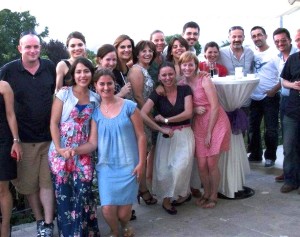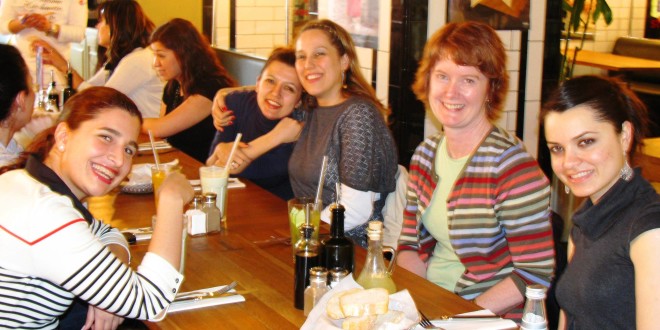Bugra Akçay. Duygu Ikibüdük. Piril Kücükçolak. Erden Öz. Ceyhun Uyanik. I sat in my office reading my class list. Nineteen students. I had no idea which names were male or female. How was I ever going to get to know them all?
More importantly, how I was going to perform as an ESL teacher? Although I loved words and enjoyed writing and editing, my formal knowledge of grammar was weak at best. I couldn’t identify predicates or dependent clauses, and the act of diagramming a sentence was foreign to me. True, I could learn these concepts before teaching them, but I worried my understanding would be superficial. If questioned, I feared I would find myself in deep water.
How quickly one set of insecurities is replaced by another.
I had started work Özyeğin University in January of 2011. My first hurdle had been getting there each day. Sankar and I lived on Istanbul’s European side but he, and now I, worked on its Asian side. We only had one car, and using public transport would be complicated, involving buses and ferries as well as mini-buses called dolmuşes.
We decided to double up, starting out for work together each morning. Ümit would drop me off first, and then Sankar. We set our alarms for 6:30 and rose just as the sun was peeking from behind the hills across the Bosphorus. Ümit arrived to pick us up at 7:15.
Between 7:30 and 8:00, traffic on The First Bridge (thus called because it was the first built to span the Bosphorus; before 1973, crossing was only by boat) would become fierce. We tried to get on its entrance ramp before the rush. It had three lanes of traffic going each way, with extra right-hand lanes on each side reserved (on pain of fine) for police cars or emergency vehicles. Each day I was impressed with the Turks’ forbearance: nobody veered into this empty lane even during the most intense traffic. I recalled Costa Rican roads, where even the hint of a jam up had everyone crowding onto the shoulders. Not in controlled, obedient Turkey.
There we sat, Ümit in the front seat, dressed in a suit and tie, his jacket folded neatly on the seat next to him. Sankar and I in back, he on his phone talking to Poland or South Africa, his enthusiastic voice precluding any conversation between Umit and me. I generally looked out the window, marveling at the wide, misty stretch of water we were crossing and checking out progress on the tiny Ortakoy mosque, so concealed by restoration scaffolding that I called it “mosque in a box.”
Once we got across the First Bridge, Özyeğin was just two exits away, past a steep grassy hillside on which, in the spring, landscapers would portray the Turkish flag and the enormous word, Turkiye, in begonias.
Ümit would drop me off at the university’s entrance, a wide expanse of smooth marble always slippery with dew, which made me think of a big, fat American lawsuit. Then Sankar and Ümit would head north along the Asian shoreline, slowing down through quaint old seaside towns like Cengilköy and Küzgüncük, and continuing past The Second Bridge (completed in 1988) to the 3M offices. In the late afternoon, we’d reverse this process.
Relieved I had something to occupy my time, Sankar never complained about this new routine, which required him to sit in the car for an extra half hour or more each morning and afternoon—and get up earlier to do so. And I never apologized.
On my first day, I reported to Director Nergis, who led me to a desk in an office with floor to ceiling windows. “This is Susan,” she announced to the other teachers I would share the room with. “She is from the States.” Nine faces swiveled toward me.
“Where in the States?” someone asked.
“Minnesota,” I replied.
“I’m from Bloomington!” This from a skinny young woman with bright red hair, whose desk was directly across the aisle. We smiled at each other in surprise. Minnesotan Caitlin Shea, would become a trusted colleague and friend in my new workplace.
Others in this office (there were two office, thirty teachers in all) included Halime, a brainy, golden-haired young woman from Gumuşhane (gumuş=silver; han=caravanserai) in northeastern Turkey; Selin, petite and pretty, from industrial Zonguldak near the Black Sea; Erim, a talented photographer from Balikesir not far from the Aegean; and Nurgul, a bundle of cheer with dark hair and eyes, also from western Turkey.
A new eight-week teaching module—and my classroom teaching duties—wouldn’t start until late January, so Nergis asked me to spend the interim perusing the textbooks used by Ozyegin’s School of English Language Instruction (SELI). In addition, nearly every day I accompanied one or another new colleague into their classroom.
I loved watching others teach and discovering what exercises might help convey my language to learners. Petek, a pretty young woman wearing a red and black print dress and slim black boots, had her Upper Level students playing a language game that involved walking around in two concentric circles. Whenever they needed to stop or change directions, she blew a whistle and they immediately obeyed. I was impressed with her authority.
Giti, originally from Iran, had a magical effect on her beginning students. With huge eyes and an equally big smile, she flew around the room, encouraging and cajoling. When a student got the right answer, she exclaimed, “I love you!” Giti’s class was all smiles.
Caitlin had a relaxed approach with her Pre-Intermediate students, kidding and laughing with them. They clearly liked her. But I noticed a some side conversations going on while she was trying to teach. She responded again and again with “shhh,” but it did little good. I vowed to have more control over my class.
Selin, though young and slight, seemed to be able to silence her Advanced class with a stern look. I was beginning to see the force of the Turkish personality. She was busy conducting a speaking test by calling students in groups of two up to her desk. While this went on, to my surprise, a male and female student canoodled—quietly—in the back of the classroom.
Selin’s students were filing out of class when one of them, a young man, tapped my shoulder and asked where I was from. When I said Minnesota, he exclaimed, “I lived there!” He went on to tell me that he had been an AFS student in Deer River, MN, located, he informed me, between Duluth and Bemidji. He described how surprised he had felt as an Istanbulu landing in an American town of only 800 people and settling on a farm, where he was expected to help take care of livestock. The Deer River community, he also told me, was “freaked out” about a lone Muslim in their midst, even more so when he told them his grandparents had moved to Turkey from Iraq.
I thought of all of the emotions and adjustments his move had undoubtedly catalyzed—in the good citizens of Deer River and in this traveling Turk. “You had a big effect on a small place,” I said. “Good for you!”
There is apparently no age limit on the fear of eating lunch alone on the first day of work. Would anybody ask me to join their table? I didn’t need to worry. Just before noon, Selin scooped me up and guided me to the cafeteria. I would never forget this considerate gesture.
In the hours I wasn’t observing, I sat with the stack of Pearson English textbooks Nergis had given me. Each book was organized around units: Personality, Architecture, Transportation, etc, but I was unsure what I was supposed to get out of them, and I felt like an imposter flipping through pages. Could others tell I didn’t know what I was doing? Later, with more experience, I would know to examine each unit and try to think of supplemental exercises and discussion topics, but I didn’t know that then, and simply proceeded woodenly in an attempt to look busy.
Also in front of me was a packet of forms and goodies the department secretary had given me. I received a loaded cash card that covered lunch in the cafeteria each noon and also refreshments at the snack bar. Sankar also got a free lunch at work; nationwide, Turkish policy seemed to be: use food to keep your workers close at hand. I was given a health insurance card that would supplement coverage I had through Sankar.
I received automatic deposit forms for my monthly paycheck. My salary would be deposited in FinansBank. Since Sankar used GarantiBank (Turkish is considered an “agglutinative” language and tends to run together words that in English would be separate) for his paycheck, I asked if my salary could instead be deposited at Garanti. No, came the answer. Hüsnü Özyeğin, the man after whom Özyeğin University was named, owned FinansBank. All teachers would bank with Hüsnü.
Nergis also presented me with a thick, bound binder outlining the SELI curriculum, which she told me was proprietary to OzU and should not be shared. In the form of a one-hundred-plus page table, the manual outlined all of the concepts we were to teach our students, including reading, writing, listening and speaking, for each of five levels: Beginning, Pre-Intermediate (called PIN), Intermediate, Upper, and Advanced. Wow! A smaller document served as our week-by-week guide.
All of this material seemed daunting, but it did promise a high degree of structure, which was comforting. As an adjunct professor in St. Paul, I had been given free rein over how and what I taught my freshman English class, the sole requirement being that I assign a research paper. That had felt like too little supervision; I’d had to discover too much on my own. That wouldn’t be the case at Özyeğin. At Hamline no one wanted to take the time to standardize what was taught, but at OzU, control and uniformity were vitally important.
One afternoon, a driver took me to the office of employment to get my work permit. My hiring seemed to refute what Monica and Felicia had told me about spouses not being able to work in Turkey. They were correct in a general sense, but I was in a special category: native speakers were considered essential to teaching English to Turks.
Toward the end of my first week, I received some final paperwork: a couple of printed flowcharts anticipating student behavior problems. One outlined steps to follow when assignments were turned in late, and another provided a process for dealing with classroom discipline. Again, organized and structured, but: classroom behavior problems at a university!?
Özyeğin University was growing in leaps and bounds. A baby boom generation born in the 1990s had now come of age with a nearly insatiable demand for higher education. Our department had doubled in size from 250 students in 2010 to close to 500 in 2011, and was expected to double again in 2012. Back in Minnesota the opposite was occurring: Hamline and many other colleges had lost students because of the recession, leading to serious budget crises.
In late January, the teaching module ended and I joined other teachers and supervisors, two in each classroom, to proctor the module’s daylong final exams. It was my first official duty as a teacher.
We teachers read word for word from an English script to instruct our test takers, guide them through the listening phase of the test, and announce breaks between sections. We were also told what to say if a student arrived late; how to accompany a student if they needed to use the bathroom during the exam; and what to do if a student finished early and wanted to leave (forbidden). It was a clear and definitive no-nonsense tutorial on how to proctor an exam. In fact, “no-nonsense,” I was beginning to realize, was not a bad way to describe Turkey as a whole.
After exam day, we convened in groups under the guidance of supervisors to correct the tests. To control for errors, two teachers went over each test paper. A strict protocol existed for marking essays, which involved first agreeing as a group of eight on scores for five sample student essays, an hours-long exercise. After we finished all the marking, scores were entered into a computer program that calculated whether each student had a score of 65% or higher and thus passed the course, or would have to repeat it.
After grades were finalized, we all received two days off while Nergis, taking into account exam results and teacher preferences, determined new teaching assignments. I was assigned Intermediate, supervised by another Nergis—Nergis Enmutlu (en=most; mutlu=happy).
A word here about Turkish last names. Prior to the 1923 formation of the Republic, Turkey was largely rural, its citizens provincial and rarely in need of more than a first name. Despite this, Ataturk asked all Turks to give themselves last names. Some Turks went the time-tested “son of” route, which involved attaching “oğlu” to the end of their father’s first name. Davutoğlu, Mustafaoğlu, etc. Many named themselves after natural phenomenon: Gül: Rose; Nergis: Daffodil; Deniz: Sea; Yaprak: Leaf.
Others focused on ideals or characteristics: Dilek: Wish; Özlem: Desire; Keskin: keen or sharp; Kutlutan: lucky; Öz: soul or authentic (this one was either quite frequently chosen or the Öz descendants were highly prolific, one runs into Öz-es all over Turkey).
Other Turks linked their names to fierce animals such as Arslan: lion, or more explicit expressions of strength such as Sert: Hard; Çetin: Tough or Şimşek: Lightning. A former Turkish Prime Minister’s last name was Demirel (demir = iron; el = hand).
Because she was petite, my new supervisor, Nergis Enmutlu was referred to as “Little Nergis,” while the head of SELI, Nergis Akbay, though by no means large, was referred to as “Big Nergis.”
As I observed my colleagues during the several days of planning, I was impressed with their confidence and industriousness, and also with the almost clockwork-like way they proceeded through the day. I felt like I was now part of some kind of teaching factory with hundreds of moving parts, an odd sensation for someone accustomed to spending much of my time alone, writing, and doing freelance editing. Right now, given that teachers had to take time from their schedules to explain procedures such as Moodle, the online classroom management system, to me, I was an errant particle jamming up the works. But once I caught on and understood the multitude of tasks at hand, I, too, would be part of this smoothly-functioning machine.

The last time I had worked full time was in 1987, almost a quarter century before. Now, I’d be putting in twenty teaching hours each week plus twenty more preparing. Locating materials, adapting them to my class’s needs, coming up with examples to illustrate grammar concepts, figuring out how much material to cover each day, and correcting essays. It occurred to me that I had probably taken on more than I could handle, and I recalled a similar situation three decades before.
Twenty five years old, with a new master’s in international nutrition, I longed to work in a developing country. My father had recently died, however and my mother didn’t want me to leave. Sankar, then my fiancé, also wanted me to stay close by.
Believing that once marriage and family intruded, I’d never again have the chance to live overseas, I put up such a long and vigorous fight that both my family and Sankar threw up their arms in defeat. I accepted one of the first jobs offered me: a position with Catholic Relief Services in The Yemen Arab Republic.
What a shock! My new home, the capital city of Sana’a, was so dusty that I could hardly breathe. And the Yemenis looked alarming: silent, black-shrouded women, men with daggers jammed into belts at their waists. The language sounded guttural and unappealing. Almost nobody spoke English. How was I ever going to adjust?
Other arriving expatriates had similar reactions and many promptly turned tail and went home. The dropout rate for Peace Corps Yemen was reputedly one of their highest in the world. But after all the fuss I’d put up, I knew I had no recourse but to stay and make the best of it.
Now, here I was in a similar situation. (Do patterns like these stalk us?) I had been so intent on getting a job that I hadn’t even begun to consider what that might mean. I would be away from home for nine hours each day, standing in front of students for four of them. And I’d signed a one-year contract. It now became ultra-clear to me why teachers needed to be contracted.
There was absolutely no way I could utter a word of complaint about what I had committed myself to. And just like all those years before in Yemen, I felt like the Fates were chuckling at my obstinacy.
My first day of teaching finally arrived. My Intermediate class would meet from 8:40 am to 12:30 pm on Mondays, Wednesday, and Fridays, and from 12:40 pm to 4:30 pm on Tuesdays and Thursdays. All of the class schedules worked similarly; Nergis had devised them so that students and teachers wouldn’t have to get up early every day.
At 8:30 on Monday morning, wearing black slacks and a cardigan over a white shirt, I walked out of my office and headed down the busy hallway toward what was to be my classroom. I carried a notebook in which I’d carefully scripted my announcements and the sequence of events for my first class period. I also had with me a stack of handouts and my new work laptop, like a pizza delivery box. Draped over my slightly trembling left arm was its long charger cord.
At the end of the hall, standing off to the side in the rush of students stood a diminutive couple, perhaps in their late forties. They were dressed simply, she in a loosely crocheted cardigan over a plain blouse and a mid-calf-length plaid skirt, with a headscarf that covered most, but not all of her hair, he in faded gray dress pants and a neatly ironed white shirt. On their faces were both pride and awe. These were clearly parents from the Turkish countryside, their son or daughter most likely the first in the family to attend college. They stood quietly, looking wistful, seeing their much-loved son or daughter off on the first day.
The couple’s presence pulled me out of my nervous self-absorption, and I found it poignant. I gave them what I hoped was a teacher-ly nod of competent reassurance.
I entered my new classroom, a smallish modern room with chairs lining three walls facing a white board, and a window on the far side. Each chair had a tiny desk attached to its arm. I put down my computer and stack of papers, and smiled at the young woman and two men who were already seated. They looked a bit surprised, and all of a sudden I was not at all sure I should have arrived early. A perennial early bird, I had been propelled out of the teacher office and down the hall by a combination of nerves and American custom. But none of my Turkish colleagues had followed.
My Turkish teachers at EFINST had always arrived late, and now I guessed that was what my current colleagues were planning to do: wait until all students were in place and make a grand entrance to show who was in charge. But I simply couldn’t do this, at least not on the first day. I wanted to welcome my students to class, not have them welcome me. I hoped my behavior wasn’t sending some kind of message of weakness.
As I bent down to connect my computer, my shoulders ached with fatigue. For years my teacher friends had told me of difficulty sleeping the night before the start of a new year. But I hadn’t expected to wake up at 2:30 this morning, unable to get back to sleep at all. The problem was that, the day before, curled up on the couch wondering what in the world I had gotten myself into, I had taken not one, but two naps.
As my students filed in, I busied myself with my laptop. Would I be able to successfully project the “First Day PowerPoint,” prepared by my Turkish colleagues, but full of errors I’d had to edit? I had tested it in an empty classroom last Friday and it had worked fine, but what about now? Did I have enough material for four hours of teaching? And most important, would my students be able to detect my nervousness and inexperience? At least my new colleagues would not be observing me!
Duygu, Bugra, Erden, Ceyhan, and all the rest. My students had taken their seats and were staring quizzically at me. I stood up straight, produced a shaky smile, and began to teach.






What a nice post Susan. It was a pleasure reading it.
Nazan